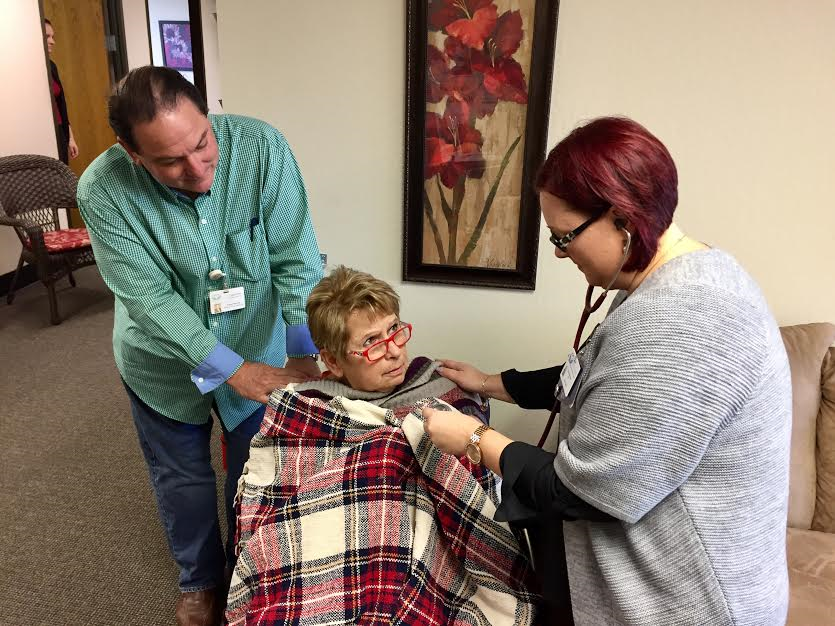
Story and photo by Joyce Coronel
Vinny Mirizio, director of business development for Companion Hospice, didn’t always work with families facing the death of a loved one. A successful businessman, he retired at 40 only to be called on to become the executive director of the Tempe YMCA, now known simply as the Tempe Y.
“I thought that would be my last job,” Mirizio said. It wasn’t to be. After the Y, there was a stint with a local hospital before a hospice company out of Oklahoma hired him. From there, he jumped to Companion Hospice, an Orange County-based company that serves 3,800 patients.
“It’s a family-owned company,” Mirizio said. “Our philosophy is treat every patient as if they are your family. That’s how we work and it’s gone very well.”
And just like family, no one is turned away. If a prospective patient doesn’t have money and doesn’t qualify for Medicare—hospice is a covered Medicare benefit—Companion will still treat them.
“If you do not have Medicare, we take you nonfunded, and that cost can be anywhere from as low as $400 to as high as $45,000.”
At press time, Companion had 11 non-funded patients being cared for.
“We had a woman who had never seen her grandchildren. We bought airline tickets for them to fly in and say goodbye,” Mirizio said. “We had a woman when we first opened who was on her way here from Russia. She had a stroke on the plane.”
Without Medicare and without funds, Companion was there as she breathed her last. Not many hospice companies are willing to do the same. “And that’s not right because everyone deserves dignity when they die,” Mirizio added.
He knows all too well how hard it can be for a family to come to terms with the demise of a loved one. In a matter of three months, he lost his father, his mother and his father-in-law.
“It was kind of tough,” he said of the experience. After all his success in the business world and the numerous boards he’s sat on through the years, the Tempe Diablo said it is his work with hospice patients and families that has been most meaningful.
“You’re dealing with people at the most critical point in their life, whether it’s the daughter dealing with her parents dying or the wife dealing with a husband dying,” Mirizio said.
“Relationships have to be built quickly.”
Part of his work involves helping families understand the importance of the spiritual aspect of their loved one’s journey.
Like other hospice companies, Companion has chaplains who visit patients and families. The bodymind-soul connection is at the forefront of what Companion does.
“I helped a young man whose mother was brought up Jewish. He had no desire to see a rabbi—they had stopped practicing their Jewish faith years and years ago.”
Mirizio told him having a rabbi stop by might be helpful because that was honoring his mother’s beliefs. It was much the same with a woman who was Catholic, he said.
The son told Mirizio the woman was no longer Catholic. She hadn’t spoken or moved for four days, but when the priest came to give her the last rites, she began to pray the Our Father along with him.
“I’ve seen tremendous, miraculous things happen,” Mirizio said of the encounter.
Sadly, many people don’t receive hospice care until the last few days of their lives. Physicians often don’t have the relationships they once had with patients and their families and might not broach the subject of death. Some seem to feel that a referral to hospice indicates failure.
“The worst thing in the world is to continue to over-treat,” Mirizio said. “Hospice is a form of treatment—it’s a path along that medical path of life.”
He remembers overhearing one physician who wanted to urge a 96-year-old patient to continue treatment, in spite of the fact it wouldn’t change the course of his illness.
“Would you do that to your father?” Mirizio asked the doctor. The patient was referred to hospice.
“Three days later, the doctor goes and sees him. The guy’s laughing and talking, because they removed all his meds. He was going to die. The doctor said, ‘I told you he isn’t going to die.’ I said, ‘He is going to die, but he’s not dying now.’
“Sometimes people just want to live, but they want to live at their pace and with what they need. It’s not what you need. And that man did pass exactly seven days later, with his family around him.”
Mirizio said Companion Hospice also works to help families and loved ones understand the dying process.
“Hospice in not just for the patient alone. It’s for the patient and those who love the patient, because a lot of times you’re not ready to say goodbye. We try to educate you and get you to that point.”
Information: companionhospice.org

